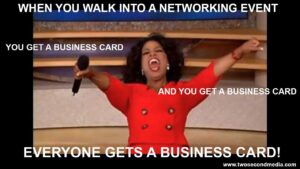Will they think I’m weird or creepy?
What if they don’t want to talk?
What do I even say!?
Want to improve your social skills and build new professional relationships?
Having approached thousands of strangers, I know firsthand that talking with strangers can be nerve-wracking.
Doing so at conferences can be even more intimidating….
- Impostor’s syndrome: That’s what hanging around successful people does to you 🙂 I can relate! There were many times when I thought to myself: “I’m nobody… who will want to talk with me?”
Now, here’s the good news: Even the most successful people likeTina Fey and Michelle Obama have self-doubts too. - Social anxiety/awkwardness/shyness: This makes it a lot harder to go up to a stranger.
- Networking stigma: However you spin it, building business relationships has got a bad rep…

That being said, starting a conversation with someone you don’t know is way easier than you think 🙂
More importantly, it can help you overcome your fear and become more confident in social situations.
What makes me uniquely qualified to write about this?
I’ve had social anxiety since young, and while I love therapy, talking to strangers is the No. 1 thing that helped me become less anxious and awkward around people.
Over the last ten years — across three continents — I’ve started conversations with thousands of strangers. I’ve also interviewed well over 700 people for my projects (namely a street journalism project and a book).

Speaking about my experience talking with strangers at TEDx!
And, I love building relationships in business — that’s how I got to work with Eben Pagan (whose collaborators include Richard Branson), Michael Simmons (Inc. 30 Under 30 founder), and John Corcoran (former Clinton White House speechwriter).
Why talk to strangers at a conference?
1. People have a much higher interest in getting to know you. That’s a big reason why people attend conferences or networking events, after all 🙂
2. Conference attendees are usually open to sharing about themselves (see #1), and many actually love doing so. The social nature of conferences helps a lot.
3. The more you talk with strangers, the better you will get at it. Just like public speaking or party hosting, talking with strangers is a skill that you can practice and improve.
4. You have a variety of natural conversation starters since you’re part of the same experience.
How do you start a conversation? (5 easy, proven ways)
Once you say hi, what do you say next?
Forget about the elevator pitch: if you’re particularly nervous at the moment, the delivery will be off, or you might forget what to say.
I recommend starting with conversation starters that make you sound natural i.e. conference/event related, such as the following:
1. Ask for direction.
- “Where do I get coffee/tea?”
- “Where’s the washroom (or the next talk)?”
This is an easy conversation starter, since it doesn’t require self-disclosure, and it helps you ease into more interesting topics.
2. Ask them about their opinion of the conference.
“How are you finding the conference so far?”
This reveals more about how they think and what they prefer, which leads to deeper conversations. You could also be more specific, for example:
“How did you find <speaker name>?”
3. Trade ideas or insights you got from the conference.
- “Anything interesting/profound that you learned from the talks?”
- “Anything interesting/profound that you learned from the speaker?”
Learning from others as well as sharing what you learned often leads to meaningful conversations. This can be a follow-up to #2.
4. Share a conference-related tidbit.
- “Did you know that <conference/speaker> is…”
- “I found out that <conference/speaker> is…”
If you know interesting facts about a conference or its speakers, share ’em!
This is a fun conversation starter — you’ll be surprised how much professional event attendees enjoy trivia, even if they might not admit it.
(To research beforehand, see tip #2 in “Other tips to make it easier to start a conversation”)
5. Ask about why they are here.
- “How did you hear about the conference?”
- “What got you interested in the conference?”
This gets them to talk a bit more about their motivation for attending.
And, if this is an industry event, check out my other article on career conversation starters at professional events.
6. Ask for talk/workshop recommendations.
- “What talk/workshop are you most excited about?”
- “What talk/workshop are you attending next?”
If they don’t have an opinion, you could be helpful by making a recommendation yourself.
Other tips to make it easier to start a conversation
1. Talk to fewer people, not more.
If you’re particularly ambitious like me, you might find yourself wanting to talk with as many people as you can, so that you squeeze the most value out of attending. That might backfire and heighten your anxiety/stress.
If so, try thinking the complete opposite — focus on quality of connections instead of quantity. I often use this as pep talk:
“Even if I only talk to one interesting person, that’s more than enough.”
Also, ask yourself the following questions:
- “At previous conferences/events, who have I enjoyed talking to the most?”
- “Who do I want to connect with the most and why?”
- “Who seems particularly interesting to talk to?”
2. Research the attendees or presenters beforehand.
If talking to strangers at a conference feels too intimidating, research who will be there by taking the following steps:
- Look at their LinkedIn profiles (pay attention to their volunteering experience, since it gives you a personal conversation lead)
- Consume their online content or interviews
- Prepare a few conversation topics at hand (I typically focus on what they seem most interested in or proud about)
The additional background information will help ease your nerves and create better conversations.
3. Invite a fellow attendee out for coffee.
Sometimes, the atmosphere at a conference can be too stifling… you know the saying “all suit-and-tie makes Jack a dull boy”?
A workaround I enjoy using is chatting people up, then asking if I could buy them coffee. This leads to more relaxed and personal conversations.
4. Introduce them to other attendees.
Do you already know of another conference or event attendee? Consider connecting people together. Here are a few easy ways you could make introductions:
- “Hi! I was talking to <attendee name>, and thought you might enjoy talking with them too. Would you be open to that?”
- “<attendee #1 name>, meet <attendee #2 name> — I talked to you both and think you will enjoy getting to know each other”
This automatically increases your perceived value, and it’s especially powerful if you’re able to connect people who have similar interests or goals.
5. Be a speaker!
Speakers are the conversation magnets at professional events — unless Richard Branson decides to drop by and say hi 🙂
Landing the keynote speech might be hard, but pitching your way into a workshop or presentation is easier than you think. (More on this in another article.)
Related article
6 non-awkward ways to end a conversation at a networking event

